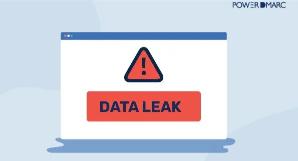- Regularly monitor and enforce compliance with data privacy regulations and security policies to maintain accountability and responsibility for data protection.
- Enhance cyber security measures by conducting regular security assessments, implementing strong access controls, and using encryption to protect sensitive data.
- Non-compliance with data privacy regulations, such as GDPR, HIPAA, and PCI-DSS, can result in substantial fines and sanctions imposed by regulators.
Data leaks are serious issues that can have significant consequences for individuals, organisations, and society. They can lead to identity theft, financial fraud, reputational damage, legal implications, customer trust loss, and cybersecurity threats. Identity theft can result in financial losses and damage to an individual’s reputation. Financial fraud can occur when cybercriminals use stolen data for fraudulent activities. Trust loss can have long-term consequences for brand reputation and customer loyalty. Legal implications include legal action, regulatory fines, and penalties for non-compliance with data protection regulations. Customer trust loss can impact business revenue, loyalty, and brand reputation. Cybersecurity threats can also arise from vulnerabilities in systems, leading to a continuous cycle of security threats.
Breach of privacy and confidentiality
Data leaks can lead to several serious consequences, including the exposure of sensitive personal information, the risk of identity theft and financial fraud, and reputational damage for affected individuals. Sensitive personal information, such as social security numbers, credit card details, addresses, and contact information, can be exposed unauthorizedly, compromising privacy and compromising the confidentiality of individuals’ personal information. This can result in unauthorised transactions, fraudulent accounts, and misuse of financial resources, causing financial damage to the affected individuals.
Reputational damage is another significant consequence of data leaks. The loss of confidentiality and privacy can tarnish the reputation of affected individuals, impacting their trust in institutions and leading to feelings of insecurity and vulnerability. Furthermore, if personal information is misused for fraudulent activities or criminal purposes, affected individuals may face difficulties in restoring their reputation and regaining trust from others.

Cybersecurity risks
Cybersecurity risks associated with data leaks include the potential for cybercriminals to exploit leaked data for targeted attacks, financial fraud, extortion, or blackmail, and the potential for the sale of stolen information on the dark web. Data leaks can expose weaknesses in an organisation’s cybersecurity infrastructure, allowing hackers to gain unauthorised access to sensitive systems and compromise data integrity. Inadequate cybersecurity practices can lead to reputational damage and financial losses.
The increased risk of further cyber attacks is also a concern. Once data is leaked, the affected organisation becomes a prime target for cybercriminals, providing valuable insights for future attacks. The reputational fallout from a data leak can attract additional scrutiny from threat actors, increasing the risk of cyber attacks targeting the organisation’s vulnerabilities.
Financial implications
Data leaks can have significant financial implications for organizations. They can lead to costs of remediation, legal liabilities, regulatory fines, and reputational damage. These costs may include hiring cybersecurity experts, legal counsel, data breach response teams, and implementing data protection measures. Non-compliance with data privacy regulations can result in substantial fines, sanctions, and reputational damage, impacting the organisation’s financial stability and market reputation.
Regulators may conduct investigations and audits to assess the extent of the data breach and determine appropriate penalties for violations. The long-term impact of a data leak can be lasting, affecting profitability, shareholder value, and investor confidence. Reputational damage can lead to customer churn, a loss of trust, and decreased revenue.
Regulatory compliance issues
The General Data Protection Regulation (GDPR) is a stringent EU and EEA regulation that mandates strict rules on data protection, privacy, and processing of personal data. The Health Insurance Portability and Accountability Act (HIPAA) sets standards for protecting sensitive patient health information, while the Payment Card Industry Data Security Standard (PCI-DSS) governs the secure handling of credit card data.
Maintaining regulatory compliance is challenging due to the complexity of regulations, resource constraints, and lack of expertise. The complexity of data protection laws makes it difficult for organisations to stay updated on evolving requirements.
Also read: 10 principles of data governance
Operational disruptions
Data breaches can lead to system downtime, productivity losses, and financial losses for organizations. Recovery from such breaches is complex and time-consuming, requiring meticulous effort. Building trust with customers, partners, and stakeholders is crucial, involving communication, transparency, and improved security measures. Meeting regulatory requirements post-breach adds another layer of complexity.
Disruptions to day-to-day operations include delayed projects, communication breakdowns, and service delivery interruptions. IT and security teams may face increased workloads, focusing on incident response, mitigation, and security enhancements. Expanding on operational disruptions caused by data breaches highlights the immediate and long-term impacts on organisations, including downtime, productivity losses, recovery challenges, and disruptions to day-to-day operations.
Reputational damage
Data breaches can lead to significant reputational damage, affecting customer trust, brand reputation, and market position. Negative publicity can tarnish the organisation’s reputation, impacting consumer perception and loyalty. Customers may hold the organisation accountable for failing to safeguard their data, resulting in difficult-to-repair reputational damage.
Also read: Sony Discloses Cybersecurity Breach Exposing Employee Data
Regaining market position is challenging, as competitors may exploit the organisation’s vulnerability. Rebuilding trust requires strategic communication, transparency, and security measures. The long-lasting effects of reputational damage can hinder the organisation’s ability to compete effectively and regain lost ground. The reputational fallout can also limit growth opportunities, hinder expansion efforts, and deter investors and stakeholders from engaging with the organisation.
Preventive measures and best practices
Organisations should strengthen their cybersecurity measures by conducting regular security assessments, implementing robust access controls, and using encryption to protect sensitive data. They should also develop an incident response plan, have robust data backup and recovery procedures, and provide regular training on cybersecurity best practices. Employees should be educated on data privacy and security through training, incentives, and rewards.
Establishing clear data privacy policies and fostering a security-conscious culture among employees is crucial. Regular monitoring and enforcement of compliance with data privacy regulations and security policies helps maintain a culture of accountability and responsibility for data protection. Expanding on preventive measures and best practices in cybersecurity emphasises the importance of proactive security measures, incident response preparedness, and fostering a culture of data privacy and security to mitigate data breaches and strengthen the overall cybersecurity posture.

